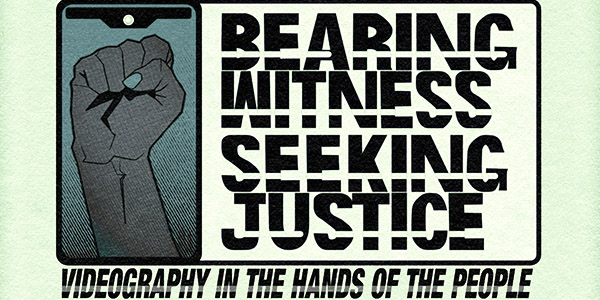Conference | October 5-7, 2022
Bearing Witness, Seeking Justice
Videography in the hands of the people

A forthcoming, three-day conference hosted by the Comparative Media Studies/Writing in the MIT School of Humanities, Arts, and Social Sciences. Participation by local citizens, engaged youths, and academics from MIT and around the globe.
The conference builds on scholarship and public policy that emerged as a result of the Rodney King uprisings in the early 1990s, continuing through the many police killings of black men and women, to the horrific murder of George Floyd, all in the context of the Black Lives Matter movement born during the past decade.
A history of videography will set the stage. Central to our discussion will be the role of videography in protecting our rights and civil liberties. The use of video technology on police forces, in banks, in hospital operating rooms, and in the matter of George Floyd and Darnella Frazier, among other high-profile events, will be analyzed from multiple vantage points. The roles played by both the mainstream and alternative press and by social media will also be scrutinized.
Video technology, a novel instrument in pursuing evidence, truth, and judicial integrity, can also be abused—infringing on civil liberties, for example, as when public and private agencies employ surveillance systems for facial recognition. And it can be subverted, its evidentiary status thrown into doubt by an environment increasingly polluted by deepfakes. Beyond and behind the images are the algorithms and platforms that can undermine as much as strengthen human rights.
The stakes are high and extend far beyond issues of everyday policing and surveillance. Videography offers a way to connect personal videos made by individuals, weaving a web that is critical in reconstructing events such as the January 6, 2021, attack on the U.S. Capitol. Public schools are developing policies on the use of cell phones on school grounds, and some are evaluating the opportunities and risks of teaching videography. Further, legal experts, ethicists, and psychologists are examining policies and practices of videography as a way to shape guiding principles and frameworks for local communities, often at odds with the recommendations of mainstream policy makers.
The conference, open to the public, will provide a forum for diverse constituencies to express their views and to showcase findings on videography as a creative tool in the quest for social justice. A formal call for proposals for papers and workshops will be posted in mid-December.
Suggested links